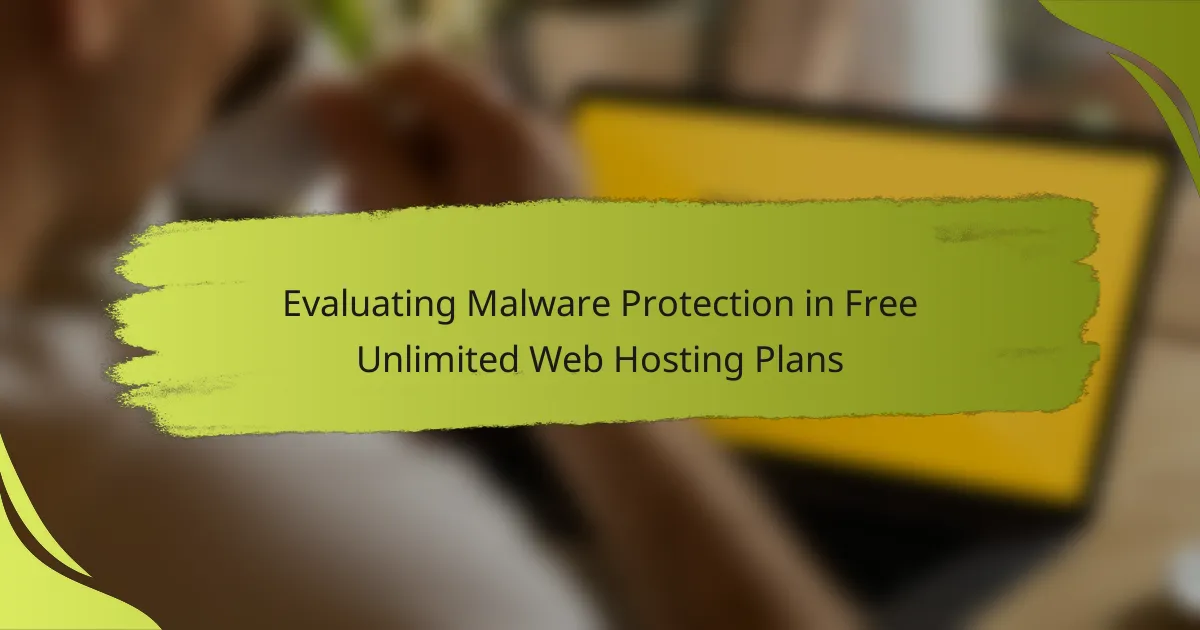When considering free unlimited web hosting plans, evaluating their malware protection features is crucial for maintaining website security. While some providers offer robust protections like real-time scanning and firewall defenses, others may leave your site vulnerable due to inadequate security measures. Understanding these differences can help you choose a hosting service that safeguards your online presence without incurring costs.
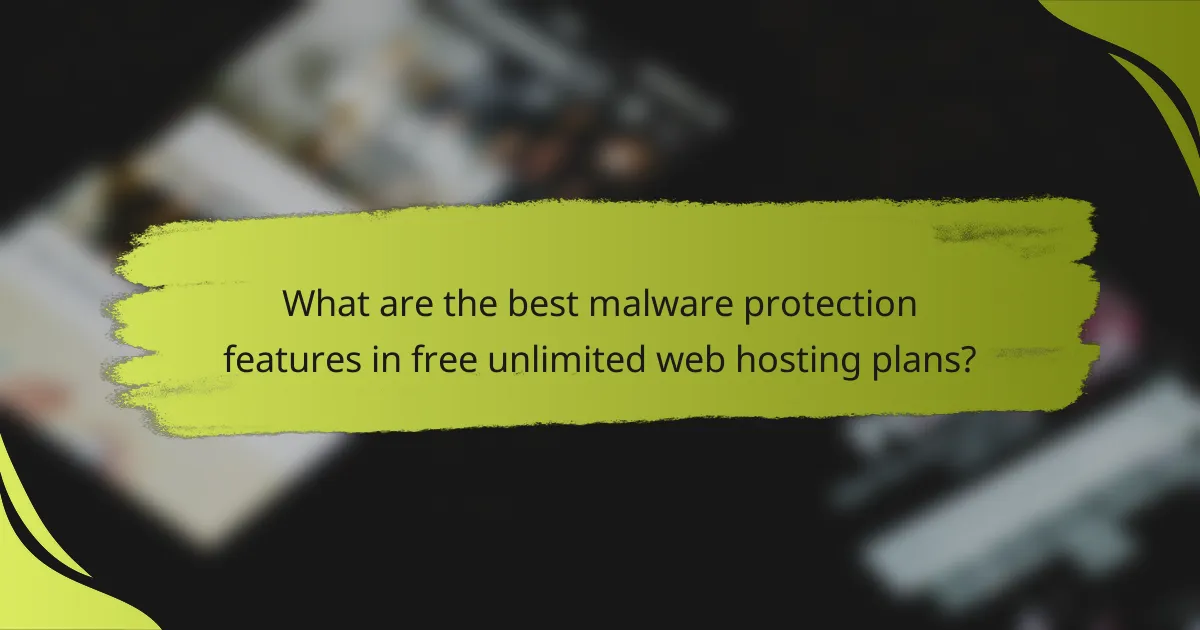
What are the best malware protection features in free unlimited web hosting plans?
The best malware protection features in free unlimited web hosting plans typically include real-time scanning, automatic updates, firewall protection, and malware removal tools. These features help safeguard websites from malicious attacks and ensure ongoing security without requiring significant financial investment.
Real-time scanning
Real-time scanning continuously monitors your website for any signs of malware or vulnerabilities. This feature detects threats as they occur, allowing for immediate action to mitigate potential damage. Look for hosting providers that offer this feature to ensure your site remains secure at all times.
When evaluating real-time scanning, consider how frequently the scans are conducted and whether the service provides alerts for detected issues. Some providers may offer daily scans, while others might scan more frequently, which can enhance security.
Automatic updates
Automatic updates ensure that your website’s software, plugins, and security protocols are kept current without manual intervention. This feature is crucial as outdated software can be a significant vulnerability for malware attacks. Choose a hosting plan that includes automatic updates to minimize risks.
Be aware that while automatic updates are beneficial, they can sometimes lead to compatibility issues with existing site features. It’s wise to check if the hosting provider allows you to customize update settings or provides backup options before applying updates.
Firewall protection
Firewall protection acts as a barrier between your website and potential threats, filtering out harmful traffic. This feature is essential for blocking unauthorized access and preventing attacks before they reach your site. Ensure that your hosting plan includes a robust firewall solution.
Different hosting providers may offer varying levels of firewall protection, so consider those that provide both hardware and software firewalls for comprehensive coverage. Additionally, inquire about the ability to customize firewall settings to better suit your site’s specific needs.
Malware removal tools
Malware removal tools are essential for quickly addressing any infections that may occur. These tools can identify and eliminate malware from your website, restoring its integrity. Look for hosting plans that offer built-in malware removal features to simplify the cleanup process.
Some providers may offer manual removal assistance or automated tools that can scan and fix issues with just a few clicks. Evaluate the effectiveness of these tools by checking user reviews or asking for success rates in malware removal from the hosting provider.
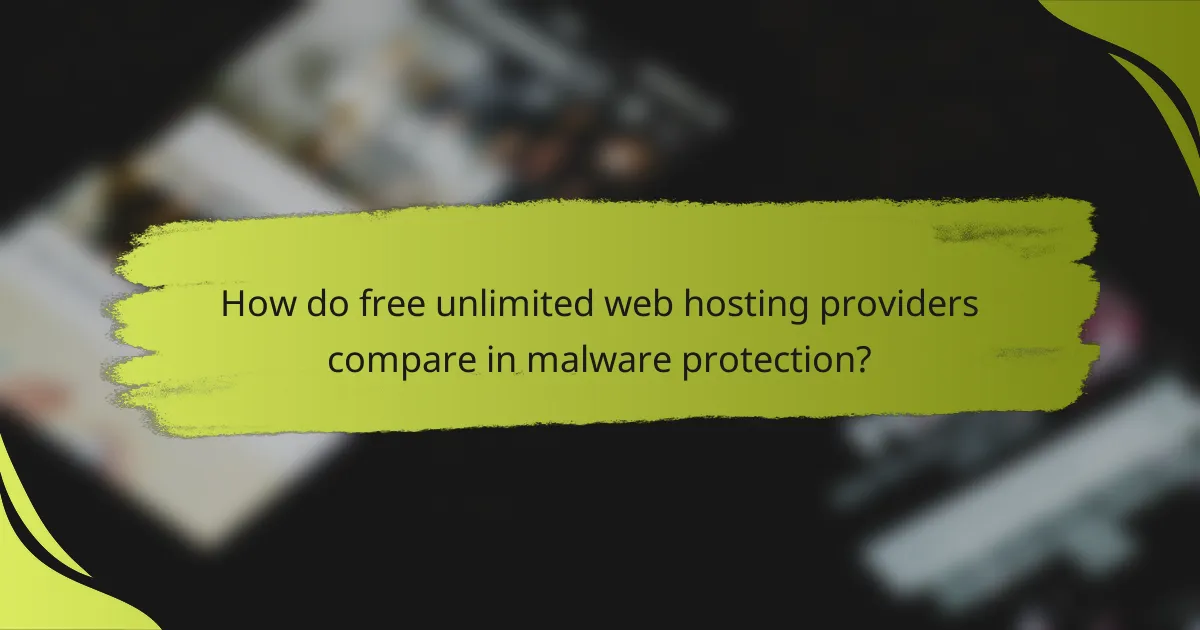
How do free unlimited web hosting providers compare in malware protection?
Free unlimited web hosting providers vary significantly in their malware protection capabilities. While some offer basic security measures, others may lack essential features, leaving websites vulnerable to attacks. It’s important to assess the level of protection each provider offers to ensure your site remains secure.
InfinityFree vs. 000webhost
InfinityFree provides a basic level of malware protection, including automatic scanning for malicious files. However, it does not offer a dedicated firewall or advanced security features, which may leave users exposed to certain threats. In contrast, 000webhost includes a more robust security suite with regular updates and monitoring, making it a safer choice for users concerned about malware.
When choosing between these two, consider the type of website you are running. For personal blogs or small projects, InfinityFree may suffice, but for business sites or those handling sensitive data, 000webhost’s enhanced security features could be crucial.
Freehostia vs. AwardSpace
Freehostia offers solid malware protection with daily backups and a built-in firewall, which helps to mitigate risks from potential attacks. This makes it a reliable option for users looking for a balance between cost and security. AwardSpace, on the other hand, provides basic protection but lacks comprehensive security measures like automated malware removal or advanced scanning tools.
For users prioritizing security, Freehostia is the better option, especially for sites that may attract more traffic or require higher levels of trust. Always review the specific security features offered by each provider to ensure they meet your needs.
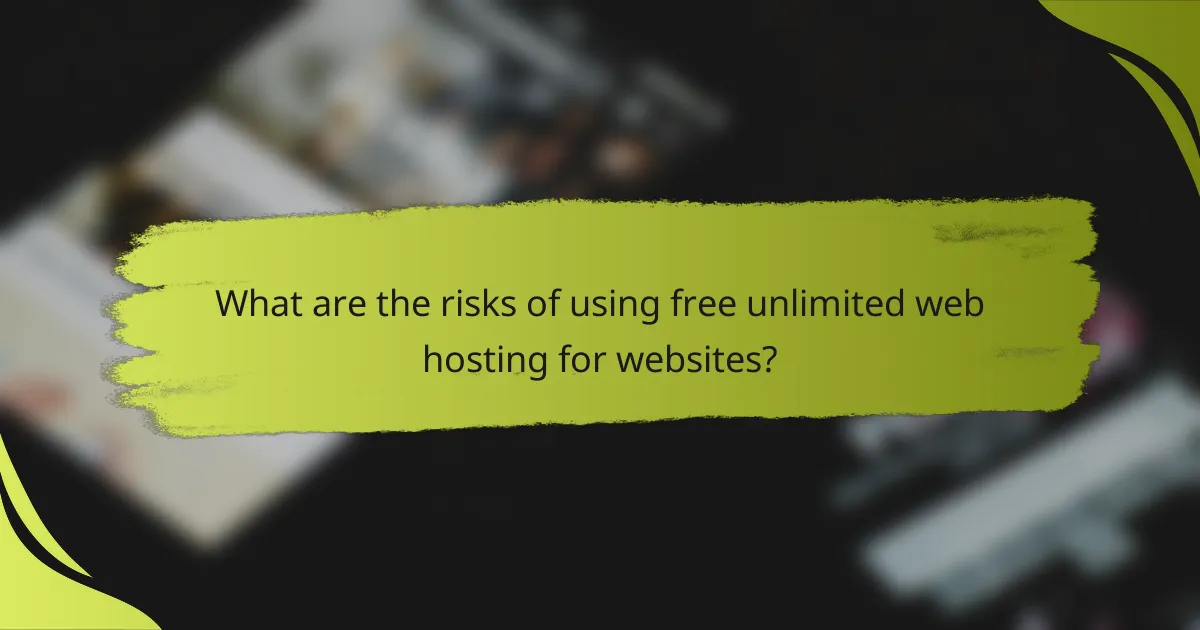
What are the risks of using free unlimited web hosting for websites?
Using free unlimited web hosting can expose websites to various risks, including security vulnerabilities and inadequate support. These risks can lead to data breaches, downtime, and a poor user experience, ultimately affecting the website’s credibility and performance.
Increased vulnerability to attacks
Free unlimited web hosting often lacks robust security measures, making websites more susceptible to cyberattacks. Common threats include malware infections, DDoS attacks, and unauthorized access, which can compromise sensitive data and disrupt service.
Many free hosting providers do not regularly update their software or provide advanced security features like firewalls and malware scanning. As a result, websites hosted on these platforms may remain exposed to known vulnerabilities, putting both the site and its visitors at risk.
Limited customer support
Customer support for free unlimited web hosting is frequently minimal or non-existent. Users may find it challenging to resolve issues quickly, leading to prolonged downtime or unresolved security threats.
Without reliable support, website owners are left to troubleshoot problems on their own, which can be time-consuming and frustrating. This lack of assistance can hinder the website’s growth and maintenance, making it essential to consider the potential trade-offs before choosing a free hosting service.
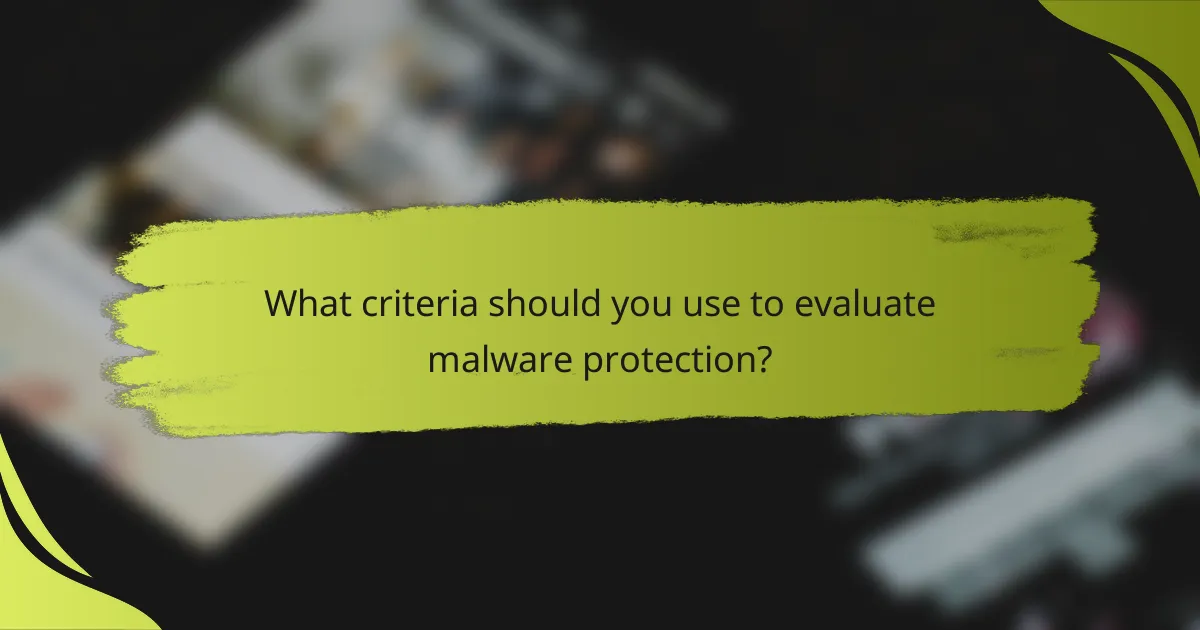
What criteria should you use to evaluate malware protection?
To effectively evaluate malware protection in free unlimited web hosting plans, focus on security certifications, user reviews, and ratings. These criteria provide insights into the reliability and effectiveness of the hosting provider’s security measures.
Security certifications
Security certifications indicate the level of protection a web hosting service offers against malware. Look for certifications like ISO 27001, which demonstrates adherence to international security standards, or PCI DSS compliance if you handle payment information. These certifications suggest that the provider has implemented robust security protocols.
Additionally, check if the hosting service undergoes regular security audits. A provider that is frequently assessed by third-party organizations is more likely to maintain high security standards. This can be a strong indicator of their commitment to protecting your website from malware threats.
User reviews and ratings
User reviews and ratings provide real-world insights into the effectiveness of a hosting provider’s malware protection. Look for feedback specifically mentioning security features, response times to malware incidents, and overall user satisfaction. High ratings from users can indicate a reliable service.
Consider using platforms like Trustpilot or G2 to find aggregated user reviews. Pay attention to comments about the hosting provider’s support in dealing with malware issues, as responsive customer service can be crucial when facing security threats. Aim for hosts with consistently positive reviews, particularly regarding their malware protection capabilities.

How can you enhance malware protection on free hosting plans?
Enhancing malware protection on free hosting plans involves implementing additional security measures, as these plans often lack robust built-in defenses. Utilizing security plugins and maintaining regular backups are two effective strategies to safeguard your website from malware threats.
Using additional security plugins
Security plugins can significantly bolster malware protection on free hosting plans. Look for plugins that offer features like firewall protection, malware scanning, and real-time threat detection. Popular options include Wordfence and Sucuri, which provide comprehensive security solutions tailored for various platforms.
When selecting a plugin, consider its compatibility with your hosting environment and the specific features you need. Some plugins may offer free versions with essential functionalities, while premium versions provide advanced protection. Regularly update these plugins to ensure they defend against the latest threats.
Regular backups
Regular backups are crucial for maintaining website integrity and recovering from malware attacks. Set up automated backups to occur daily or weekly, depending on your site’s update frequency. Many free hosting services offer basic backup options, but using third-party tools like UpdraftPlus can enhance this process.
Store backups in a secure location, such as cloud storage or an external hard drive, to ensure they are safe from malware. In case of an infection, having a recent backup allows you to restore your site quickly, minimizing downtime and data loss. Always verify the integrity of your backups before relying on them for recovery.
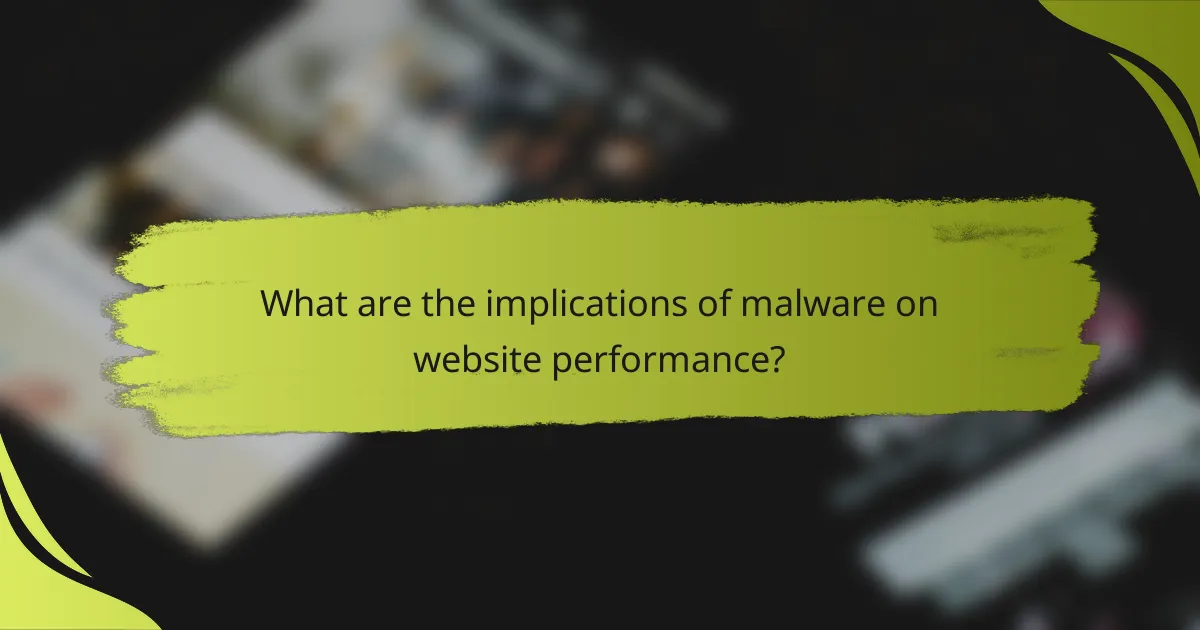
What are the implications of malware on website performance?
Malware can significantly degrade website performance, leading to slower loading times and potential data loss. These issues not only frustrate users but can also harm a site’s reputation and search engine rankings.
Slow loading times
Malware often consumes server resources, which can result in slow loading times for your website. A delay of just a few seconds can lead to higher bounce rates, as users are less likely to wait for a page to load.
To mitigate this, regularly monitor your website’s performance using tools like Google PageSpeed Insights. If you notice a decline in speed, investigate potential malware infections immediately.
Potential data loss
Infections can corrupt or delete critical data, leading to potential data loss. This can include website content, user information, or even entire databases, which can be devastating for any business.
Implementing regular backups is essential to protect against data loss. Consider using automated backup solutions that store copies of your site in secure locations, allowing for quick recovery in case of an attack.
